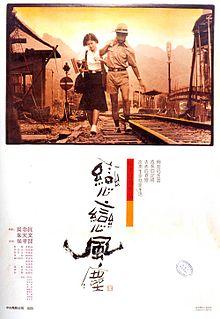
This marks the third and last installment of Hou Hsiao-hsien’s coming-of-age trilogy. It’s interesting to note that each of the three films is about a main male character who is growing up, with the age increasing in each successive film though they are all different characters. Here the protagonist is a young man who must leave his home to make his own way in the world. Naturally this is also the age when he must deal with girl problems.
Wan and Huen are a boy and a girl who grow up together as best friends in a rural village in Taiwan. When Wan finishes school, he decides not to try for university and goes to Taipei to work, living in a cinema with his friends. A year later, Huen does so as well and the implicit understanding is that they are saving up money so that they can marry. They continue to support one another in the city with Huen helping to take care of Wan when he falls sick. However their plans are thrown into disarray when Wan receive a draft notice to serve in the military for three years. Huen naturally promises to wait for him and writes him letters.
This is a plot that is as old as the history of cinema and Hou Hsiao-hsien adds little enough to it that everyone should be able to tell what’s coming. Wan and Huen make for an adorable couple but I find that this film veers a little too much into the sweetly sentimental end of the spectrum. They’re implicitly boyfriend and girlfriend but they are portrayed as being so obediently chaste with each other that they never so much as hold hands. I joked with my wife that he obviously loses the girl because they never even had sex before he leaves but it’s a serious enough point. Perhaps in the director’s estimation this is the last bit of growing up that Wan has to do, that this sweet puppy love that he had with Huen never could be the basis of an adult relationship. But it could also be that this really is the director’s idea of an idealized romance. I think that Hou’s usual modus operandi of filming the characters at a remove makes it difficult to decide which is the case or if it even matter.
To me, the real strength of this film are its many scenes of life in Taiwan in that period, presented as anecdotes that are unrelated to the central romance. A scene like Wan’s father offering him a cigarette at the dinner table is a standard rite of passage to adulthood but a more affecting version of it is when the group of friends vent to one another about their problems with their employers while hiding it from their parents. That really drives home the fact that they are no longer children and must in fact protect their parents. Then there are the totally random stories like a fire in a building opposite where Huen works or a boat carrying mainlanders in distress comes ashore while Wan is serving as a soldier. The mainlanders are terrified that they will be killed but Wan’s unit only wants to help them. These little stories add so much life to the film and I found them to be more interesting than the main plot.
Overall while I found the romance to be a little too trite, this remains a beautifully shot film and a wonderful portrayal of that period of life in Taiwan. It’s amazing that the director is able to wring such credible performances out of people who are plainly amateurs and his affection for the countryside is palpable. Highly recommended.